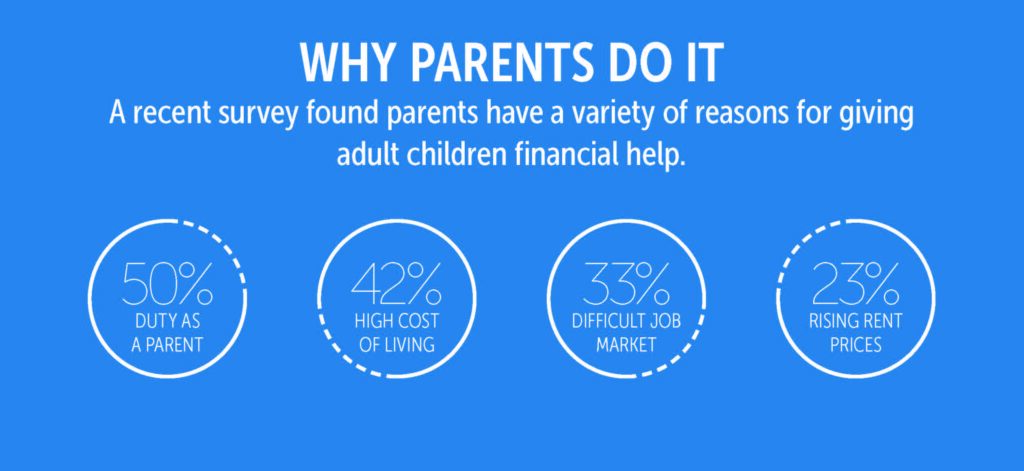
72% of female gray retirees didn’t view their engagement ring as a financial asset nor realize selling it could give them cash to invest and supplement their retirement savings.
*Building a Financial Fresh Start, Worthy.com


72% of female gray retirees didn’t view their engagement ring as a financial asset nor realize selling it could give them cash to invest and supplement their retirement savings.
*Building a Financial Fresh Start, Worthy.com

In a 2023 Credit Karma survey, nearly a third of parents with children over 18 reported currently providing them with financial support. 64% of those parents said they provide support by allowing their kids to live at home, and another 49% pay monthly bills for them.* Both sides have good reasons. Most adult children are trying to save money and get student loans under control. The adjacent graph lists parents’ various reasons for continuing support.
While there are times when help is necessary, parents need to think of their financial health and overall well-being first. If you have an adult child who is still under your financial wing, you need to establish boundaries for your assistance.
The best plan is to establish financial goals for when the child will become financially self sufficient up front. Or, if you’re already helping, the time is now.
Assistance might be provided until they save enough for housing, they can afford their student loan or car payments, their divorce settlement is worked out, or a similar financial milestone.
For a child with a health issue or addiction, consider talking with your legal advisor about a special needs trust, with funds going directly to the child’s treatment and recovery. And there’s nothing wrong with asking kids to contribute an affordable amount for their stay.
*Survey by Qualtrics for Credit Karma, November 2023

Quite often, data security concerns surface when an employee leaves. But that’s not the only time your data may be at risk.
If you have yet to develop a data protection policy that applies to both new hires and existing employees, do so now. Part of that plan should include specific penalties for those who break the rules. Strive to limit the data employees can access to only what they need to perform their jobs.
On the other hand, avoid having online services and tools with credentials that are available to only one worker.
The plan should provide for quickly shutting off online services if needed.
Having a backup strategy in place and routinely backing up data is critical. With your backup strategy, consider services that can track remote systems and render them inoperable if you detect suspicious use.
Be aware that even if sharing login/password information is against company policy, employees could be doing it to save time. Don’t forget contractors and consultants that have access to certain systems. You can’t be too careful with your company’s data.
A friend asked if he could rent our lake house for a couple of weeks in August. Are there any tax consequences if we do?
Not if you observe the IRS’s short-term rental rules. You can rent out your personal residence (including a vacation home), and any money earned from the short-term rental isn’t subject to income tax if the rental doesn’t exceed 14 days in the tax year.
There’s a caveat, though. The rental income becomes taxable if you rent your personal residence for more than 14 days total during any tax year. So, take care to keep accurate records of your rental.

Lately, it seems the stock market has become obsessed with Consumer Price Index (CPI) reports, hanging on the release of every new report. You may be wondering why.
The Bureau of Labor Statistics releases a CPI report each month. It’s based on price data collected over the month. The prices for the goods and services the BLS uses to calculate the index are collected from about 23,000 retail and service establishments in 75 urban areas throughout the US. Rent data comes from about 50,000 landlords or tenants. Weightings for items are set from reported expenditures as estimated by the Consumer Expenditure Survey.
The markets weren’t that sensitive to the CPI when inflation was low and steady. But since inflation reached a record high in 2022, the Federal Reserve repeatedly increased central bank rates, which affected the market. That’s because higher rates could cause the economy to fall into a recession, impacting the markets and investors’ returns. Your financial professional can suggest ways to diversify your investments to help minimize the effects of market volatility.
Sharon, an independent real estate broker, has recently joined the growing number of gray divorcees (people divorcing later in life). She’s looking at what she faces and how to handle her new status.

Fortunately for Sharon, she made an agreement with her ex-husband that her business wouldn’t be part of marital assets for distribution in any divorce settlement. That doesn’t necessarily mean business as usual.
She should keep work and divorce activities separated on her computer and use only her personal email for divorce correspondence. More than ever, she should maintain detailed records to ensure that capital contributions and their sources are recorded to the business.
Sharon will also inventory all her assets and investments and review her goals to update her personal financial and retirement plans — including changing her beneficiary designations. And she has an appointment with her attorney to rewrite her will and update her other estate-planning documents.
Client Profile is based on a hypothetical situation. The solutions discussed may or may not be appropriate for you.

Just as you allocate assets to a combination of stocks, bonds, cash, and other investments, you may want to consider allocating retirement assets among tax-deferred, tax-free, and taxable accounts for a potentially greater retirement income.
Like many Americans, you probably have most of your retirement savings in a traditional 401(k) or similar tax-deferred retirement plan. The benefits of tax-deferred plans have been proven time and time again. You save federal and possibly state income tax while contributing, and your contributions grow tax-deferred until you withdraw them at retirement when many people expect to be in a lower tax bracket.
But that’s the sticking point. If you’ve been successful in business, at retirement time, you may find that you aren’t in a lower tax bracket than you were when you were working. You could lose some of that tax-deferral advantage.
With Roth 401(k) accounts and IRAs, you invest with after-tax dollars and gain no current tax benefit, but you’ll owe no income or capital gains tax on any withdrawals you make during retirement. Another tax-free vehicles to consider is municipal bonds, which offer income free from federal income tax and state income tax if they are issued in the state where you reside. However, the interest earned may be lower than possible with Roth accounts.
Taxable accounts offer a wide range of investment choices, including stocks, bonds, mutual funds, and real estate. They also require you to invest with after-tax dollars and pay taxes every year on any income you earn or capital gains you realize.
As the old TV commercial said, “It’s not what you make, it’s what you keep.” Tax diversification can spell the difference between having income choices or having taxes force you to downgrade your lifestyle. Note: Tax diversification isn’t a DIY strategy. It requires a thorough understanding of tax codes and your overall financial situation.
Parents paying for school-age children’s day camp this summer may be eligible for the federal child and dependent care tax credit (CDCC). Note that it’s available only for the expense of day camp, not overnight camp. But there is more to it.
The CDCC generally helps parents or caregivers cover the cost of qualified care expenses for a child under age 13 or a spouse or other dependent (a parent, for example) who is mentally or physically unable to care for themselves and will have lived with you more than half of 2024.
You may deduct only a percentage (20% to 35%) of qualifying expenses. For anyone with $43,001 or more adjusted gross income in 2024, that percentage is 20%. The credit is further capped at $3,000 a year for one dependent or $6,000 for two or more.

The busiest, most successful business owners recognize the importance of having a business succession plan. But long hours can keep owners from conducting periodic reviews of the plan to help ensure it continues to address succession goals, both operational and financial. Here are some items to review that you might not readily think of.
Multigenerational family ownership is not necessarily the cure for an operational succession plan. Emotions aside, start by analyzing key employees/positions and how a disruption, such as the potential loss or unavailability of current vital employees, would affect the business. Develop a strategy defining the roles to be assumed by second or third-generation ownership, and provide training.
Also review facilities and consider how the business would operate if one or more of your current locations or critical systems become unavailable. Review the business’s current mechanisms to protect, secure, back up, and, if necessary, replicate critical data systems, infrastructure, and applications. Technological change is constant.
While you probably have a general sense of the value of your businesses, scheduling an independent appraisal will enable you to know the value. And, of course, you should review any insurance, cross-purchase, entity-purchase, or other agreements in place for transferring business assets to family or partners.
If you have any personal guarantees on business loans, the issue needs to be resolved with lenders before there’s a problem. In a worst-case scenario, these loans could get called shortly after a majority owner/operator passes away. That could be a significant hardship for a business trying to succeed with a prearranged financial succession plan.
Your strategy should also include how any business real estate will be handled. Will it remain with the heirs, go to partners, or will new owners also buy the real estate? A formal valuation of real property generally should be made and updated every five years or whenever there’s a material change in facts or circumstances.
The Time for Succession Planning is Now – the busiest, most successful business owners recognize the importance of having a business succession plan.
Child and Dependent Care Tax Credit – parents paying for school-age children’s day camp this summer may be eligible for the federal child and dependent care tax credit.
Tax Diversification for a More Secure Retirement – you may want to consider allocating retirement assets among tax-deferred, tax-free and taxable accounts.
The Market’s Obsession with the CPI – it seems the stock market has become obsessed with the Consumer Price Index.
Protect Your Security Data – often, data security concerns surface when an employee leaves.
Cutting the Financial Cord – in a 2023 Credit Karma survey, nearly a third of parents with children over 18 reported providing them with financial support.